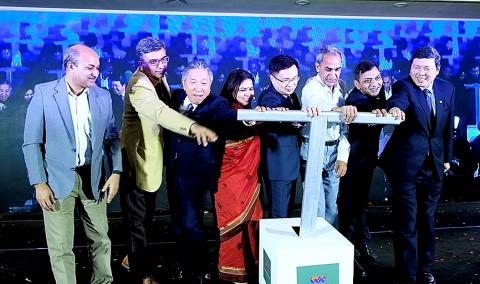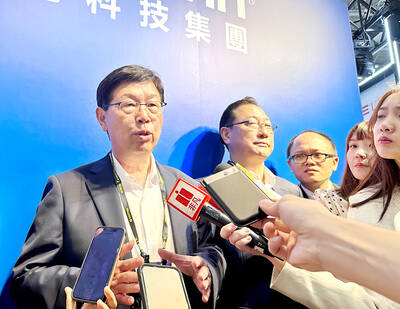The Taiwan External Trade Development Council (TAITRA, 外貿協會) is going to open a new office in India’s capital next month to help Taiwanese businesses seeking to expand their markets in South Asia, TAITRA chairman James Huang (黃志芳) announced on Tuesday.
The New Delhi office would become TAITRA’s fourth office in the country, following those in Mumbai, Chennai and Kolkota, and its 61st in the world, Huang told a news conference in New Dehli.
India, the world’s sixth-largest economy, has regained its title as the world’s fastest-growing major economy due mainly to a slew of economic policies launched by Indian Prime Minister Narendra Modi over the past few years, and has the potential to be the most powerful driver of global economic growth in the 21st century, he said.

Photo: CNA
Despite its small land area and lack of natural resources, Taiwan is home to the world’s leading information and communication technology, machinery, automobile parts, petrochemical and “green” energy industries, and is a leader in developing technologies for “smart” city solutions, he said.
Its companies have also set up a large number of manufacturing facilities in China and Southeast Asia, Huang said.
Taiwan is going to be an important partner of India, as Modi is promoting the Made in India, Digital India and other initiatives, while Taiwan is pushing its New Southbound Policy, he said.
TAITRA has organized a Taiwan Expo 2018 for next month in it new office to help expand bilateral trade and investment, he said.

Taiwan Transport and Storage Corp (TTS, 台灣通運倉儲) yesterday unveiled its first electric tractor unit — manufactured by Volvo Trucks — in a ceremony in Taipei, and said the unit would soon be used to transport cement produced by Taiwan Cement Corp (TCC, 台灣水泥). Both TTS and TCC belong to TCC International Holdings Ltd (台泥國際集團). With the electric tractor unit, the Taipei-based cement firm would become the first in Taiwan to use electric vehicles to transport construction materials. TTS chairman Koo Kung-yi (辜公怡), Volvo Trucks vice president of sales and marketing Johan Selven, TCC president Roman Cheng (程耀輝) and Taikoo Motors Group

Among the rows of vibrators, rubber torsos and leather harnesses at a Chinese sex toys exhibition in Shanghai this weekend, the beginnings of an artificial intelligence (AI)-driven shift in the industry quietly pulsed. China manufactures about 70 percent of the world’s sex toys, most of it the “hardware” on display at the fair — whether that be technicolor tentacled dildos or hyper-realistic personalized silicone dolls. Yet smart toys have been rising in popularity for some time. Many major European and US brands already offer tech-enhanced products that can enable long-distance love, monitor well-being and even bring people one step closer to

RECORD-BREAKING: TSMC’s net profit last quarter beat market expectations by expanding 8.9% and it was the best first-quarter profit in the chipmaker’s history Taiwan Semiconductor Manufacturing Co (TSMC, 台積電), which counts Nvidia Corp as a key customer, yesterday said that artificial intelligence (AI) server chip revenue is set to more than double this year from last year amid rising demand. The chipmaker expects the growth momentum to continue in the next five years with an annual compound growth rate of 50 percent, TSMC chief executive officer C.C. Wei (魏哲家) told investors yesterday. By 2028, AI chips’ contribution to revenue would climb to about 20 percent from a percentage in the low teens, Wei said. “Almost all the AI innovators are working with TSMC to address the

FUTURE PLANS: Although the electric vehicle market is getting more competitive, Hon Hai would stick to its goal of seizing a 5 percent share globally, Young Liu said Hon Hai Precision Industry Co (鴻海精密), a major iPhone assembler and supplier of artificial intelligence (AI) servers powered by Nvidia Corp’s chips, yesterday said it has introduced a rotating chief executive structure as part of the company’s efforts to cultivate future leaders and to enhance corporate governance. The 50-year-old contract electronics maker reported sizable revenue of NT$6.16 trillion (US$189.67 billion) last year. Hon Hai, also known as Foxconn Technology Group (富士康科技集團), has been under the control of one man almost since its inception. A rotating CEO system is a rarity among Taiwanese businesses. Hon Hai has given leaders of the company’s six